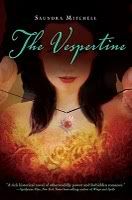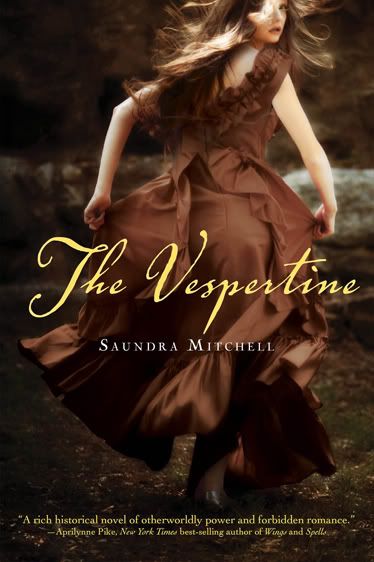by Saundra Mitchell
Harcourt Children's Books
March 2011
The Vespertine combines historical fiction, with just a touch of mystery, supernatural occurrences and romance. In 1889, Amelia van den Broek is sent for the season from her small village in Maine to the relatively young city of Baltimore to stay with her cousin Zora, hopefully to entice a suitor for an appropriate match. While Amelia is a bit shy and overwhelmed by the city sights, Zora is exuberant and the two of them quickly become best friends. As was traditional during the time, the girls share a bed, meaning that each evening feels like a slumber party, as they whisper secrets to each other all night.
This is a world of such courtly and restrained manners that merely accidentally brushing wrists while seated next to a handsome dinner guest is enough to create a flurry of passionate feelings and enamored confusion in Amelia. Women must be tightly chaperoned at all times, and simply sneaking away to walk a few blocks down the street fills Amelia with a delicious, delirious sense of danger.
The girls make their rounds, collecting visitor's cards, attending dinner parties and balls, flirting and dancing. Zora quickly sets her heart on Thomas Rea, a doctor's son, a less than ideal, but not inappropriate choice while Amelia makes the socially disastrous mistake of becoming smitten with Nathaniel Witherspoon, an impoverished artist who makes his living as a professional party guest.
I was intrigued by the idea of the professional fourteenth guest, hired specifically as to avoid unlucky dinner parties of 13 members. It turns out this is based on a real tradition, originating in France, called a quatorzieme.
The plot thickens when Amelia's psychic gift begins to present itself. She has the ability to see the future, in absorbing visions which strike her just at the moment of sunset, or "the vespers" of the early evening. In an era when seances and mediums were all the rage, Amelia quickly is informally billed as, "Maine's Own Mystic" and soon finds herself and her cousin Zora very much in demand in society circles, as all the young women in town are eager to have their fortunes read.
I loved the scene where a rich heiress peremptorily calls Amelia for an audience, and presents her demands for fortunes to be told for her and all her party guests. As Amelia explains the limits of her gift - she can only see the future just at sunset, and only for one person at a time, she tells her, "Only a fraud can promise you everything, it's truth that has limits." I thought it made sense that Amelia becomes nearly drunk with the feeling of power her gift has given her. Towards the very end of the book, Amelia discovers she does have the ability to tell more than one fortune at once, by "spirit writing" as she goes into her evening trance, which made me curious how else the limits of her gift could be pushed.
I was happy to see that the cover of the book had been changed from the ARC. The ARC cover hints at her sunset abilities with it's rich orange tones, but the character's face is hidden by the font, and the necklace seems overly important. I thought the new cover, with it's dark, rushed, desperate feel was much more appropriate.

The only thing that marred the book for me was the discordant timeline. The story begins in the fall of 1889, with Amelia as a ruined madwoman, being kept in her brother's attic. In flashbacks, we learn the story of her wonderfully adventurous summer in Baltimore. While reading the story, it was hard to immerse oneself in the surroundings and enjoy the gaiety of the parties and balls knowing that Amelia has such a terrible future ahead of her. I was surprised and delighted then, by the ending of the book, which really turns everything around for Amelia and Nathaniel. The ending answers a lot of questions, and leaves the reader feeling very satisfied, yet with just enough mystery to warrant a sequel. This is a beautifully written book, with rich, lyrical prose that transports you to another time. I highly recommend it.
I received a free copy of this book from the publisher.

Nicely written review. I like how this book contained a lot of historically accurate little bits like the 14th dinner guest or the social norms at the time. I agree with you on that cover. The ARC cover isn't very appealing to me, but the official cover with that brown dress, flowing hair, and sense of urgency really catches my interest.
ReplyDeleteThank you! I know, there's some poor artist out there, disappointed that their cover wasn't chosen, but the photograph cover is so much better for the book I think.
ReplyDeleteWhat a great review Madigan! I'm really excited to read this one, that time period is so fascinating to me, though I don't know that I could have survived being constantly chaperoned and all the social etiquette probably would have overwhelmed me, but I love reading it about it:) Aside from the timeline, this sounds like a a fabulous book!
ReplyDeleteI actually read this one recently and am glad to read another well-written review about it! And I think the official cover will make a lovely addition to my bookshelf, don't you?
ReplyDeleteAsher K.
Thanks for stopping by the blog, by the way!